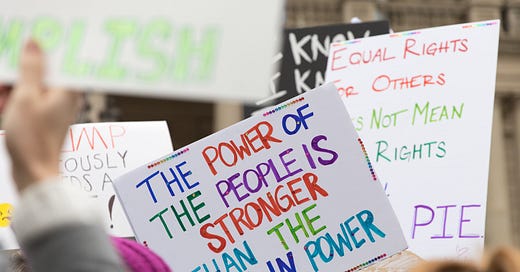It wasn’t an ordinary Saturday in America. Then again, maybe it was.
Across the country, protests erupted in response to an administration increasingly defined by hardline, unconventional, and often cruel policies. Along the National Mall, spectators watched as tanks rolled and troops marched past, saluting the president in a spectacle that felt more autocratic than democratic.
Meanwhile, tragedy unfolded in Minnesota: two state lawmakers and their spouses were shot—one couple killed, the other gravely injured. The shooter left behind a manifesto and a long list of targets. We don’t yet know the full motive, but the indications are disturbing.
Abroad, Israel has launched attacks on Iran, sparking retaliation. War drags on in Ukraine. Hostages remain in Gaza, though few are believed to be alive. Gaza lies in ruins, starved of adequate humanitarian aid.
National Guard troops and Marines have been deployed to the streets of Los Angeles. In the face of potential conflict between protesters and the military, law enforcement fires rubber bullets and CS gas at peaceful protesters. Tariffs fluctuate wildly, causing economic instability and creating a sense of economic whiplash. Prices continue to climb.
The federal government has turned its fire inward, targeting law firms, universities, modern medicine, and public education. Congress, paralyzed by fear, ambition, or indifference, offers little resistance. Lies about immigrants, judges, and basic facts circulate like small-town gossip.
It feels wrong, like the prologue of a dystopian novel. But this isn’t fiction.
Why is anyone surprised?
We’ve already lived the prologue.
On January 6th, we watched a mob storm the U.S. Capitol—erecting gallows for the vice president, wielding bear spray, and beating police with gates and flagpoles. For hours, we waited for the president to speak. He didn’t. He was enjoying the show.
We heard JD Vance spread lies about immigrants eating pets. We watched as Donald Trump, once again a candidate, promised peace in Ukraine and lower prices—if only we returned him to power. We saw him pardon the very people who brought chaos, violence, and desecration to our Capitol—because they did it for him.
And yet we act surprised when Senator Lisa Murkowski admits she’s afraid. We pretend to be shocked when judges, journalists, and elected officials are swatted, threatened, or murdered.
I want to be hopeful. I do. But it’s hard to offer the promise of light when so many people choose to sit comfortably in the dark.
These aren’t normal times. Or they shouldn’t be.
We’re living the early chapters of a dark narrative. One driven by demonization, division, and the erasure of empathy. A story where cruelty is policy, and polarization is strategy.
But there is resistance. And it must grow—despite fear, despite danger, despite despair.
The book isn’t finished. We’re writing it with every word we speak, every post we share, every conversation we dare to have. Each of us shapes what comes next.
Silence—whether born of fear or indifference—is complicity.
And complicity is the death sentence of democracy.





